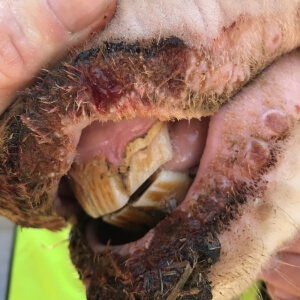State Veterinarian Warns Livestock Owners of Virus Threat
Aug 17, 2020

The Tennessee state veterinarian’s office wants to make livestock owners and veterinarians aware of an outbreak of vesicular stomatitis virus (VSV) in several midwestern states.
VSV is a disease of primarily horses and cattle, but can also affect sheep, goats, pigs, llamas, and alpacas, causing blister-like lesions on the skin. In cattle, sheep, goats, and pigs, the symptoms are similar to Foot and Mouth Disease. States currently affected are Arkansas, Kansas, Missouri, Nebraska, and Oklahoma.
“Although we do not have any cases of VSV in Tennessee, it’s important that livestock owners remain vigilant,” State Veterinarian Dr. Samantha Beaty said. “People tend to move animals this time of year for trail rides and horse and livestock shows. People traveling outside Tennessee with susceptible animals should be mindful of the potential for spread.”
People bringing livestock into Tennessee should call the state veterinarian’s office for Certificate of Veterinary Inspection requirements. The phone number is 615-837-5120.
If livestock enter Tennessee from an affected state, susceptible species should be examined by an accredited veterinarian within 72 hours of import and have no clinical signs of vesicular stomatitis. The livestock should not have been on a premises under quarantine for VSV in the previous 30 days.
“Biting flies and other insects are the primary transmitters for the virus, so we encourage livestock owners to use insect bite prevention and control methods to prevent spread,” adds Dr. Beaty. “If you find a lesion on your animal, you should contact your veterinarian and the state veterinarian’s office right away.”
There is no cure for VSV, but symptoms can be treated with anti-inflammatories for pain and taking steps like softening food for animals with oral lesions.
Humans can contract vesicular stomatitis by coming into contact with lesions, saliva, or nasal secretions from infected animals. In people, the disease causes an acute influenza-like illness with symptoms such as fever, muscle aches, and headache. To avoid exposure, individuals should use personal protective measures when handling affected animals, including wearing gloves and washing their hands.
The State Veterinarian's office seeks to prevent the spread of disease through import and movement requirements, livestock traceability, disaster mitigation, and the services of the C. E. Kord Animal Health Diagnostic Laboratory.
VSV is a disease of primarily horses and cattle, but can also affect sheep, goats, pigs, llamas, and alpacas, causing blister-like lesions on the skin. In cattle, sheep, goats, and pigs, the symptoms are similar to Foot and Mouth Disease. States currently affected are Arkansas, Kansas, Missouri, Nebraska, and Oklahoma.
“Although we do not have any cases of VSV in Tennessee, it’s important that livestock owners remain vigilant,” State Veterinarian Dr. Samantha Beaty said. “People tend to move animals this time of year for trail rides and horse and livestock shows. People traveling outside Tennessee with susceptible animals should be mindful of the potential for spread.”
People bringing livestock into Tennessee should call the state veterinarian’s office for Certificate of Veterinary Inspection requirements. The phone number is 615-837-5120.
If livestock enter Tennessee from an affected state, susceptible species should be examined by an accredited veterinarian within 72 hours of import and have no clinical signs of vesicular stomatitis. The livestock should not have been on a premises under quarantine for VSV in the previous 30 days.
“Biting flies and other insects are the primary transmitters for the virus, so we encourage livestock owners to use insect bite prevention and control methods to prevent spread,” adds Dr. Beaty. “If you find a lesion on your animal, you should contact your veterinarian and the state veterinarian’s office right away.”
There is no cure for VSV, but symptoms can be treated with anti-inflammatories for pain and taking steps like softening food for animals with oral lesions.
Humans can contract vesicular stomatitis by coming into contact with lesions, saliva, or nasal secretions from infected animals. In people, the disease causes an acute influenza-like illness with symptoms such as fever, muscle aches, and headache. To avoid exposure, individuals should use personal protective measures when handling affected animals, including wearing gloves and washing their hands.
The State Veterinarian's office seeks to prevent the spread of disease through import and movement requirements, livestock traceability, disaster mitigation, and the services of the C. E. Kord Animal Health Diagnostic Laboratory.